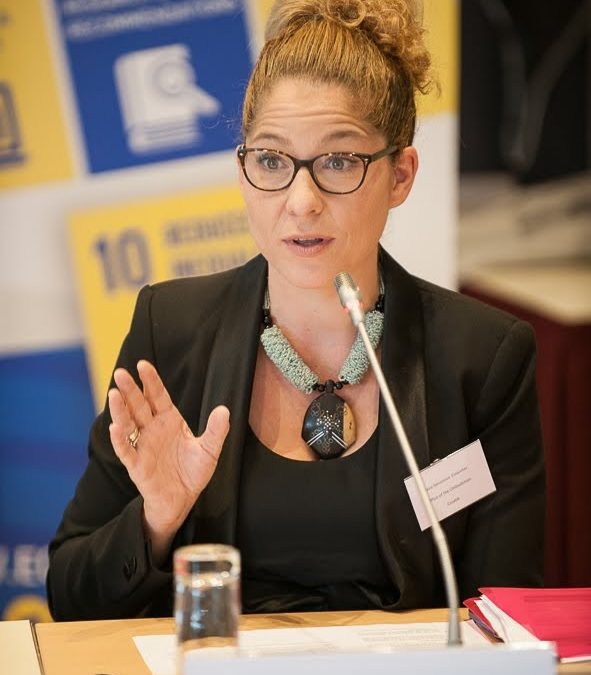During the Annual General Assembly of the European Network of Equality Bodies (Equinet), held in Bruxelles on October 23rd, the Deputy Ombudswoman Tena Šimonović Einwalter, was reelected for her second term as the head of the Executive Board of the organization and will continue to lead the Network’s activities on antidiscrimination and equality promotion in the following two-year period.
Members of the newly elected Executive Board from nine European countries have recognised Equinet’s achievements during the first two years of the Deputy Ombudswoman’s term as Chair of the Board and have unanimously trusted her with further leadership of the Network, recognised in Europe for its engagement in combating discrimination in 36 European countries. Alongside large number of activities directed at education and exchange of good practices between members, ahead of the 2019 European elections, Equinet published a Recommendation on combating discrimination and hate speech in election campaigns. Additionally, European Commission and the European Commission against Racism and Tolerance (ECRI) have ultimately adopted Recommendations on Standards for Equality Bodies, which Equinet has been advocating for years. These documents acknowledge the importance of the equality bodies’ work in achieving equality and social cohesion, guaranteeing the minimum requests for their independence and efficiency.
During the Bruxelles meeting, General Assembly also voted to accept the application of the Ombudsperson Institution of Kosovo as a new Equinet member, which brings the Network’s membership to a total of 49 equality bodies.
After presenting the Annual report for the previous year, members adopted the Workplan for 2020, which addresses the challenges and explores the opportunities on topics including sexual harassment, promoting equality of older persons, Sustainable Development Goals (SDGs), artificial intelligence and digitalisation, as well as implementing standards for equality bodies, among other important priorities. Equinet will continue its collaboration with European institutions, and will also explore intersectionality in order to support policy and legal improvements suited for the specific needs of victims of multiple, intersecting grounds of discrimination. This includes engaging with young people, ensuring the implementation of existing rights of people with disabilities and impoverished women, tackling Antigypsyism and working for Roma equality, tackling discrimination and intolerance against Muslims, as well as building capacities of equality bodies on rights and equality of trans and intersex persons.
Besides deciding on governance and membership issues, representatives of the equality bodies had the opportunity to meet the members of the European Commission, the Fundamental Rights Agency (FRA), and the European Network of NHRIs (ENNHRI) to discuss the development of antidiscrimination policies on the European level, key policy and legislative developments as regards to equality and non-discrimination at European levels. The discussions were focused around potential discriminatory effects of Artificial Intelligence (AI) and digitalisation. The results of a recent survey were also presented, evidencing the rising challenge that the equality bodies face with the development of AI systems, but also showing the need to strengthen the capacity of the bodies to monitor and prevent potential discrimination that automated decision making can result in.


